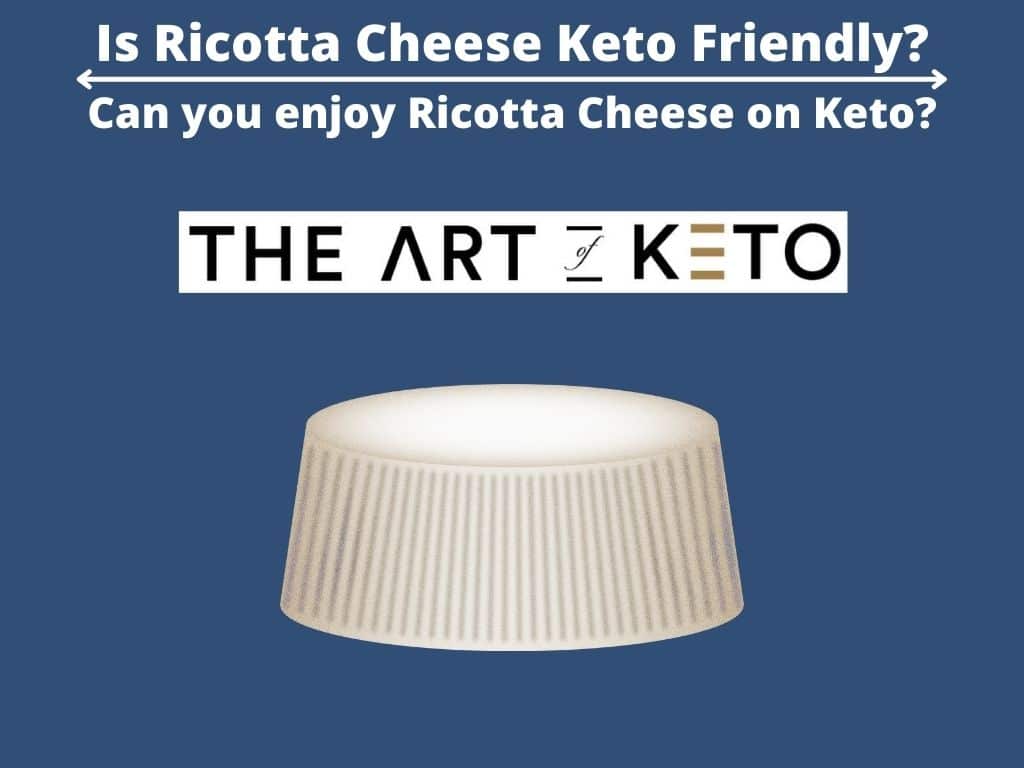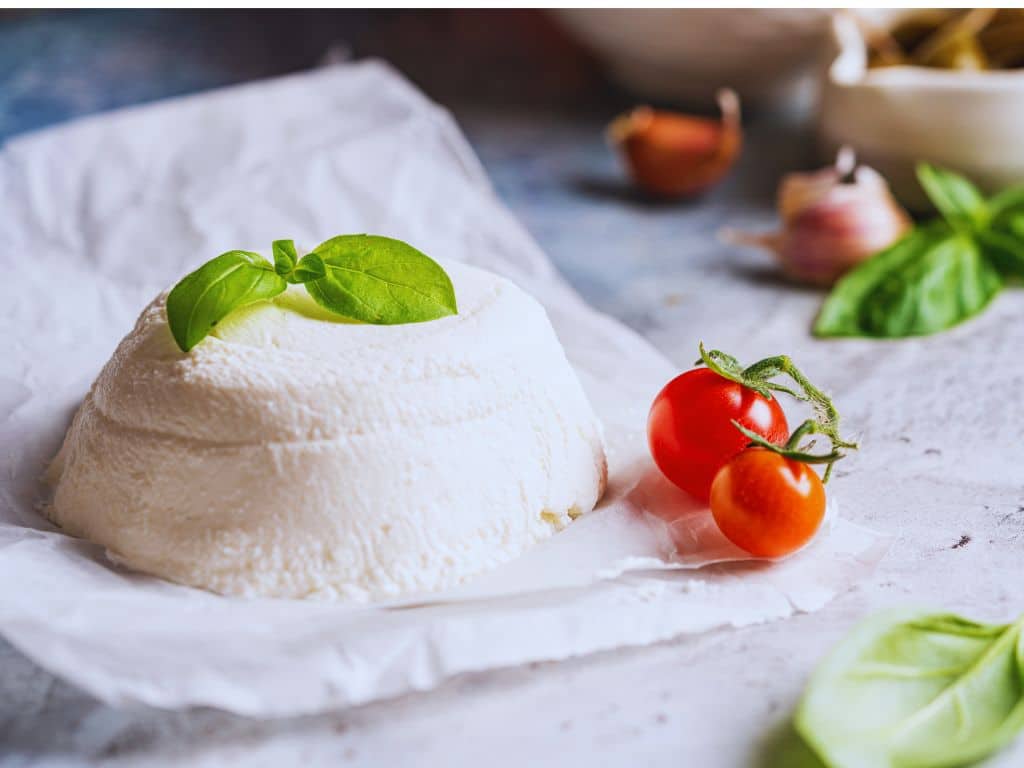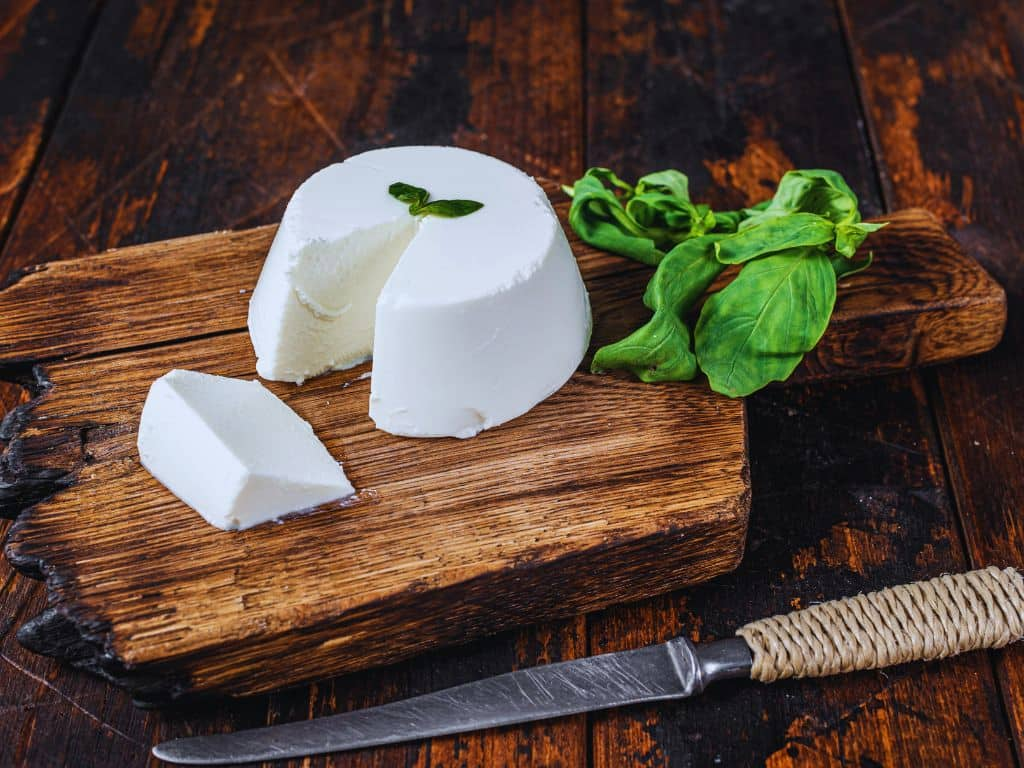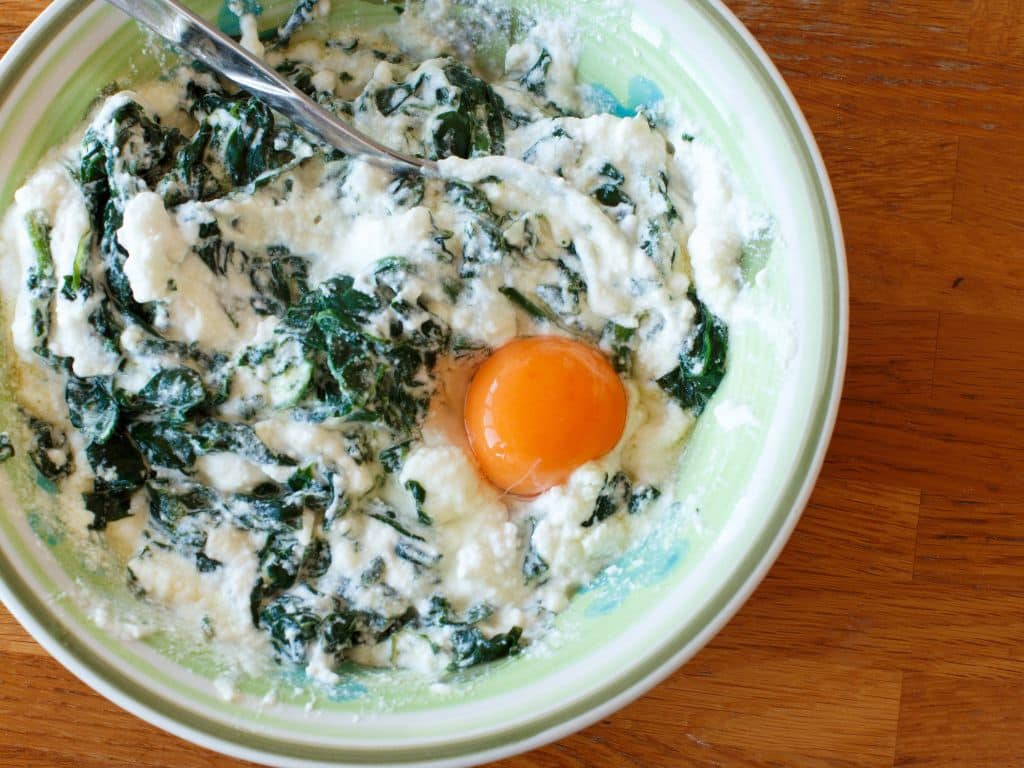Cheese, oh glorious cheese! Is there anything more satisfying than that creamy, melty goodness? Whether it's sprinkled atop a pizza, stuffed inside a gooey lasagna, or devoured straight from the fridge, cheese holds a special place in our hearts (and stomachs).
But if you're one of the brave souls diving into the world of the ketogenic diet, you might find yourself wondering, “Is ricotta cheese keto?”

The answer is a little more complicated than a simple yes or no. Why? Keto is all about high fat and low carbs and since Ricotta cheese is full of fats you should be able to eat it on a keto diet. So, yes Ricotta is keto friendly but in moderation.
Let’s shed some light on the subject and help you navigate the deliciously cheesy waters of the keto lifestyle. But first, let's start with the basics: what exactly is ricotta cheese, and what is this mysterious ketogenic diet all about?
Nutritional Information Of Ricotta Cheese
Ricotta cheese is more than just a delicious addition to lasagna or a heavenly topping for pancakes. It's also packed with essential nutrients that make it a worthwhile contender for your keto menu.
Let's break down the macronutrients and reveal why ricotta deserves a spot on your ketogenic plate:
- High in Fats
When it comes to fat, ricotta cheese takes the crown. With approximately 14 grams of fat per 100 grams, it can add that creamy, indulgent touch to your meals without derailing your keto goals. Plus, fat is your keto best friend, as it keeps you satiated and helps your body stay in that magical fat-burning state.
- High In Protein
Moving on to protein, ricotta holds its ground quite well. With around 11 grams of protein per 100 grams, it's an excellent source of this muscle-building macronutrient. Protein not only fuels your body but also aids in repairing and maintaining your precious muscles, helping you achieve that toned physique you're after.
- Low Carb
Now, let's address the elephant in the room: carbohydrates. While ricotta cheese does contain a small amount of carbs, it's relatively low compared to other cheese varieties. With just around 3 grams of carbohydrates per 100 grams, it won't throw your keto journey off track.
- Other Nutrients
Aside from its macronutrient profile, ricotta cheese also packs a nutritional punch in the form of vitamins and minerals. While it may not be a kale salad, it still contributes to your overall nutrient intake.
It's a fantastic source of calcium, which is crucial for maintaining strong bones and overall health. It also provides a decent amount of phosphorus, essential for energy production and maintaining healthy cells. Plus, it contains essential vitamins and minerals like vitamin A and vitamin B12, further adding to its nutritional value.
Note: All the nutritional information is based on data available for one-half cup of whole milk ricotta cheese (129 grams). [Source: USDA]

Comparison to Other Keto-Friendly Cheeses
So, how does ricotta cheese stack up against other keto-friendly cheeses? Here’s a comparison of Ricotta with other cheeses based on macros:
- Fats: When it comes to fat content, ricotta certainly holds its own against the competition. It boasts similar fat levels as other keto favorites like cream cheese and brie. However, if you're looking for a fat powerhouse, mascarpone might steal the spotlight with its luxurious richness.
- Protein: In terms of protein, ricotta stands tall alongside cottage cheese, providing a healthy dose of this muscle-building macronutrient. But if you're after a protein punch, Parmesan and Swiss cheeses are the heavyweight champs.
- Carbs: Ricotta's low carb content makes it a prime choice for your keto adventures. While some other cheeses might contain slightly fewer carbs, such as cheddar or mozzarella, the difference is minimal, and ricotta's creamy goodness more than makes up for it.
How Is Ricotta Cheese Made?
Ricotta cheese has a rich history and has been made for centuries. It is made from the by-products of other cheese-making processes, which gives it a unique flavor and texture.
The basic recipe calls for just a few simple ingredients: milk, salt, and an acid. The acid, often lemon juice or vinegar, causes the milk proteins to coagulate, forming curds. These curds are then drained, resulting in the smooth and creamy ricotta cheese we all love.
Traditionally, it was created by reheating the whey leftover from cheese production, allowing the proteins to separate and form curds. This process gave ricotta its name, as “ricotta” means “recooked” in Italian.
While the traditional method is still used by many artisans, modern variations of ricotta cheese have also emerged. Some producers now use whole milk instead of whey, resulting in a creamier and more indulgent version of the cheese. There are also low-fat and fat-free options available for those watching their calorie intake.
For keto enthusiasts, it's important to pay attention to the carbohydrate content of ricotta cheese. While ricotta itself is relatively low in carbs, it's crucial to read the labels of different brands and varieties. Some commercially produced ricotta cheese may contain added ingredients or thickeners that could increase the carb count. Opting for organic or homemade ricotta can help ensure a more keto-friendly option.
The Role Of Dairy In The Keto Diet
Dairy can be a tasty and versatile addition to your keto journey. It offers a rich source of essential nutrients like calcium, vitamin D, and protein. But what makes dairy particularly interesting for us keto folks is its fat content, which is a crucial component of this low-carb, high-fat eating plan.

When it comes to dairy on the keto diet, the fat content is what we're after. Full-fat options like cream, butter, and, you guessed it, ricotta cheese, are the stars of the show. These high-fat dairy products provide the necessary fuel to keep you in that glorious state of ketosis, where your body becomes a fat-burning machine.
Here are the two main benefits of incorporating dairy into your keto journey:
- Source of protein: Dairy is a fantastic source of protein, which is essential for maintaining and building muscle mass. Plus, protein keeps you feeling full and satisfied, helping you resist those tempting carb-loaded snacks.
- Add Flavor: Dairy products like ricotta cheese also offer a delightful taste and texture that can jazz up your keto meals. Whether you're enjoying a dollop on top of your low-carb pancakes or using it as a base for a luscious cheesecake, dairy products add that extra touch of decadence.
But, as with any good thing, there can be potential concerns and risks when it comes to dairy on the keto diet. Dairy products, including ricotta cheese, naturally contain some carbohydrates. While the amount varies, it's important to factor in those carb counts when planning your meals to stay within your desired keto macros.
Furthermore, some individuals may have sensitivities or intolerances to dairy products. If you’re lactose intolerant or notice any adverse reactions like bloating or digestive issues after consuming dairy, it might be worth considering alternative options or consulting with a healthcare professional.
How Ricotta Cheese Can Fit Into A Keto Meal Plan
Ricotta cheese is a versatile ingredient that can be enjoyed in many ways while still keeping your carb count low. Now that we've established that ricotta cheese can indeed be part of your keto journey, let's explore some delicious and inventive ways to enjoy it:
Incorporating Ricotta Cheese Into Your Keto Diet
- Use It as a Spread: Instead of reaching for high-carb spreads like peanut butter or jam, try spreading some ricotta cheese on low-carb crackers or celery sticks. Top it off with a sprinkle of herbs and spices for an extra flavor boost.
- Blend It Into Smoothies: Add a couple of tablespoons of ricotta cheese to your favorite keto smoothie recipe for a creamy texture and added protein. It pairs well with flavors like berries, cocoa powder, and vanilla.
- Create Keto-Friendly Desserts: Whip up a quick and easy keto dessert by combining ricotta cheese with a sugar substitute, vanilla extract, and a pinch of cinnamon. Layer it with sliced almonds or crushed dark chocolate for a delightful treat that won't derail your keto goals.
Keto-Friendly Dishes Using Ricotta Cheese
- Zucchini Lasagna Rolls: Replace traditional lasagna noodles with thinly sliced zucchini and layer them with a mixture of ricotta cheese, spinach, and ground meat. Top it off with a sugar-free marinara sauce and a generous sprinkle of mozzarella cheese. Bake until golden and bubbly for a delicious keto-friendly lasagna alternative.
- Keto Pancakes: Combine ricotta cheese, almond flour, eggs, and a dash of vanilla extract to create a fluffy and satisfying pancake batter. Cook them on a non-stick pan until golden brown, and serve with a dollop of whipped cream and a handful of fresh berries.
- Stuffed Bell Peppers: Hollow out bell peppers and stuff them with a mixture of ricotta cheese, cooked ground sausage, and your favorite keto-friendly vegetables. Bake until the peppers are tender and the cheese is melted and gooey.
- Cheesy Stuffed Chicken Breasts: Mix ricotta cheese with herbs and spices, stuff it into chicken breasts, and bake them to perfection for a mouthwatering dinner option.
- Berrylicious Parfait: Layer fresh berries, a dollop of ricotta cheese, and a sprinkle of chopped nuts for a delightful keto-friendly dessert. It's a sweet treat that won't sabotage your low-carb goals.
- Cheesy Veggie Omelet: Whip up a fluffy omelet filled with sautéed veggies and a generous helping of ricotta cheese. This breakfast delight will kickstart your day with a burst of flavor.
Remember, the versatility of ricotta cheese knows no bounds, and the possibilities are endless. So, get creative, experiment in the kitchen, and enjoy the creamy goodness while staying true to your keto goals.
Potential Benefits Of Adding Ricotta Cheese To A Keto Diet
Here are the benefits of adding Ricotta cheese to your keto diet:
- Ketofriendly: Ricotta is high in fats and low in carbs, making it perfect for keto. Protein is also a crucial micronutrient that is present in Ricotta cheese. It helps to repair and build tissues, supports muscle growth, and aids in various bodily functions.
- Rich in Calcium: Calcium is not only vital for strong bones and teeth but also plays a role in nerve function, muscle contraction, and blood clotting. Luckily, ricotta cheese is a calcium-rich powerhouse, giving you a delightful way to meet your calcium needs while staying in ketosis. Plus, who can resist that velvety texture?
- Controls Cravings: Ricotta cheese has the potential to improve satiety, meaning it can help you feel satisfied and content after a meal. The combination of its protein content, along with its creamy goodness, can make you feel fuller for longer periods, reducing the temptation to snack on carb-laden treats. So, with ricotta cheese in your meals, you’ll feel fuller for longer. Say goodbye to pesky cravings!
- It’s Affordable: The ketogenic diet typically emphasizes consuming high-quality sources of protein and healthy fats, such as grass-fed meat, wild-caught fish, organic eggs, and avocados. These choices can be more expensive compared to processed and lower-quality alternatives. However, Ricotta cheese is an easily available and affordable ingredient for keto followers.
Potential Risks Of Consuming Ricotta Cheese On The Keto Diet
Everything has a good and bad side. Let’s check out the potential risks of adding ricotta cheese to a keto diet:
- Weight Gain: Ricotta cheese is high in fat, so it's important to balance your overall macronutrient intake to stay in ketosis and achieve your weight loss goals. If you’re not careful, consuming it in excess could lead to weight gain.
- Hormone Imbalance: One concern is the possible hormone disruption that can arise from consuming commercial dairy products. Commercially produced ricotta cheese may come from cows that have been treated with hormones, which could potentially interfere with your hormonal balance. If this is a concern for you, consider opting for organic or hormone-free ricotta cheese to mitigate any potential risks.
- Spoils Easily: Another risk to be mindful of is the possibility of consuming mold-contaminated dairy products. While it's relatively rare, mold contamination can occur in ricotta cheese if it's not stored properly or if it's past its expiration date. To minimize this risk, make sure to check the quality of the ricotta cheese before consuming it. Look for any signs of mold, discoloration, or an off odor. If anything seems off, it's best to err on the side of caution and discard it.
Comparison To Other Keto-Friendly Cheeses
Now, let's compare ricotta cheese to some other keto-friendly cheeses. Parmesan, for instance, steals the spotlight with almost zero carbs and a higher protein content than ricotta. Mozzarella, another beloved cheese, also shines on the keto stage, as it boasts minimal carbs and a delightful stretchy texture that can enhance your keto-friendly pizza creations.

Here is a comparison of Ricotta cheese with other keto friendly cheeses:
- Taste and Texture Comparison
When it comes to taste and texture, ricotta cheese has a distinct advantage. Its creamy, slightly sweet flavor makes it a versatile ingredient in both sweet and savory dishes. Think of velvety cheesecakes, luscious lasagnas, or even delightful pancakes. Ricotta cheese brings a smooth and delicate texture to these dishes, elevating them to culinary perfection.
However, if you're looking for a cheese with a bolder taste, Parmesan steals the show once again. Its sharp and nutty flavor adds a burst of umami to any dish. On the other hand, mozzarella cheese brings a mild and milky taste that pairs beautifully with fresh basil and tomatoes in a Caprese salad.
- Availability and Cost Comparison
Ricotta cheese is widely accessible, making it a breeze to find in most grocery stores. It comes in various forms, including whole milk, part-skim, and even lactose-free options, catering to different dietary needs. This cheese is quite versatile and can be incorporated into numerous recipes, whether you're making a lasagna or adding a dollop to your morning omelet.
In terms of cost, ricotta cheese is generally budget-friendly, making it an excellent choice for those on a keto diet without breaking the bank. Parmesan, on the other hand, can be a bit pricier due to its aging process, but a little goes a long way thanks to its robust flavor. Mozzarella cheese falls in the middle range, offering a balance between affordability and taste.
Final Verdict
After delving into the depths of nutritional information, we've come to a definitive conclusion. The answer to the burning question, “Is ricotta cheese keto?” is a resounding YES! Ricotta cheese can indeed be a part of your keto journey.
Remember, while ricotta cheese is keto-friendly, moderation is key. Keep an eye on your portion sizes to ensure you stay within your desired calorie and macro range. Also, opt for full-fat ricotta cheese whenever possible, as it provides a richer taste and helps you maintain ketosis more effectively.
So, if you enjoy ricotta cheese and it fits well within your overall macronutrient goals, there's no reason to exclude it from your keto menu. Just remember to opt for organic or hormone-free options if possible, and always check for signs of mold before digging in.
Disclaimer: As with any dietary changes, it's best to consult with a healthcare professional or a registered dietitian before making significant adjustments to your diet. They can provide personalized guidance based on your specific needs and goals.
If you'd like to learn more about keto friendly foods, please click on one of the links below:
Is String Cheese Keto Friendly?
Is Provolone Cheese Keto Friendly?
